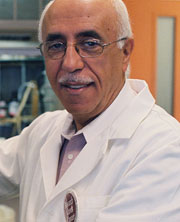 Dr. Yusuf Abul-Hajj became part of the University of Minnesota’s College of Pharmacy in 1968. He served as head of the Department of Medicinal Chemistry from 1984 to 2005 and continues to be a member of the faculty in the College.
Dr. Yusuf Abul-Hajj became part of the University of Minnesota’s College of Pharmacy in 1968. He served as head of the Department of Medicinal Chemistry from 1984 to 2005 and continues to be a member of the faculty in the College.
Interview Abstract
Dr. Yusuf Abul-Hajj begins his interview by reflecting on his education, his choice to pursue medicinal chemistry at the University of Wisconsin, the difficulties of transition and travel between Palestine and the United States, and the Arab community in Minneapolis. Dr. Abul-Hajj then describes his early career in the College of Pharmacy at the University of Minnesota, with particular attention to the clinical pharmacy movement, the creation of the Pharm.D. program, and problems that consequently arose within the basic science, research-oriented departments of the College. He then discusses the following topics: collaboration between the Department of Medicinal Chemistry and the Chemistry Department; the revival of social and administrative pharmacy; relations between clinical and basic science faculty in the College; collaborations between faculty in Medicinal Chemistry and faculty in the Medical School; the appointment of Gilbert Banker and his tenure as dean of the College; collaboration between Medicinal Chemistry and the pharmaceutical industry; his own research on estrogen and cancer; drug development in academia; and the creation of the Center for Drug Design.
Biographical Sketch
Yusuf Abul-Hajj was born in Jerusalem, Palestine. He earned his bachelor’s in 1962 and his master’s in 1964, both from American University of Beirut. He moved to the United States and earned his Ph.D. from the University of Wisconsin’s College of Pharmacy in 1968. He was recruited to the College of Pharmacy at the University of Minnesota by Dean Lawrence Weaver in 1968. His research has primarily concerned the relationships between estrogen and cancer. More specifically, he has investigated how tumors can transform cholesterol into estrogen, the development of alternative treatments for breast cancer, specifically aromatase inhibitors, and how estrogens are involved in carcinogenesis. He served as head of the Department of Medicinal Chemistry from 1984 to 2005. Dr. Abul-Hajj continues to serve as a professor in the College of Pharmacy.
Interview Transcript